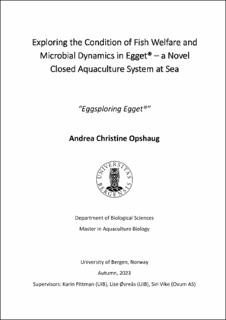| dc.description.abstract | The Norwegian Atlantic salmon (Salmo salar) aquaculture industry faces significant challenges, prompting the need for innovative approaches to enhance sustainability. One such innovation is the prototype Egget®, a novel 1850m3 floating closed containment aquaculture system developed by Ovum AS for the initial sea phase of salmon production. This study assesses the impact of Egget®’s production routines on fish health and welfare during the first-ever production cycle (October 9th, 2022 - February 22nd, 2023) through three sampling campaigns (November 10th, December 12th , and February 16th). A minor amoebic gill disease (AGD) outbreak occurred on November 29th during the sampling period but was resolved without treatment despite the persistence of the amoeba in the environment. The mortality rate in Egget® was 1.2% over the five months, with a specific growth rate of 1.6% in the four months of sampling. Key health indicators were monitored, including gill and skin mucosal dynamics, as they are vital components of the fish's immune system. Microbiota analyses were conducted on gills, inlet/outlet water, and the system's biofilm. Using PCR sequencing of the 16S rRNA gene, DNA extraction, and bacterial concentration with flow cytometry, this study characterised microbial species and differences in composition from the various sources. The gill mucous barrier showed an acute immune response to the Paramoeba peruans amoeba in December, resulting in decreasing mucous cell size. Subsequently, an adaptation to the amoeba resulted in a new homeostatic state of mucous cells with increased size and volumetric density of mucous cells in the gill lamellae. Skin mucous barriers remained consistently stable. Microbiota analyses revealed non-pathogenic bacteria associated with marine aquaculture environments, indicating a healthy ecosystem. No accumulation of bacteria was observed in water samples or biofilm. Furthermore, maintaining stable environmental conditions and minimal fish handling has positively impacted fish health and welfare in this investigation. This first production cycle in this pioneering system highlights the presence of healthy fish exhibiting robust growth and low mortality compared to both standard farming practices and Egget®'s sibling fish raised in open net pen. In addition, an active and responsive mucous barrier in both gills and skin was observed. Notably, there was no observed tendency for microbiota accumulation or alteration in the water samples from the biofilm. These indications suggest that closed systems like Egget® may play a pivotal role in the future of the aquaculture industry, as such systems have the potential to enhance and expedite salmon production while ensuring sustainability, lowering labour, and promoting fish welfare. | |
